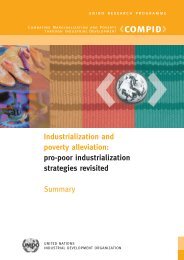Manual on the Development of Cleaner Production Policies ... - Unido
Manual on the Development of Cleaner Production Policies ... - Unido
Manual on the Development of Cleaner Production Policies ... - Unido
You also want an ePaper? Increase the reach of your titles
YUMPU automatically turns print PDFs into web optimized ePapers that Google loves.
DEVELOPMENT OF CP POLICY<br />
MODULE 5: POLICY TOOLS AND INSTRUMENTS<br />
SLIDE: The ECOPROFIT approach<br />
• Voluntary for industry, but gives recogniti<strong>on</strong> and publicity;<br />
• Aims to improve both ec<strong>on</strong>omic and envir<strong>on</strong>mental performance;<br />
• Work includes joint workshops, individual c<strong>on</strong>sulting and ECOPROFIT<br />
award;<br />
• Municipality participates in <strong>the</strong> award process and supports enterprise<br />
networking.<br />
<br />
The ECOPROFIT approach provides a good illustrati<strong>on</strong> <strong>of</strong> how to organize a<br />
CP programme <strong>on</strong> <strong>the</strong> municipal level. You may want to note that several<br />
countries are currently following a similar approach.<br />
Background<br />
ECOPROFIT, an innovative scheme to implement joint <strong>Cleaner</strong> Producti<strong>on</strong> projects, was developed in<br />
1991 in Graz, Austria. To date, more than 100 companies have participated in <strong>the</strong> programme in Graz<br />
itself. In total, more than 300 Austrian companies have implemented ECOPROFIT projects. Since<br />
1995, <strong>the</strong> ECOPROFIT approach has been successfully used in Brazil, Czech Republic, Germany,<br />
Hungary, Slovakia and Ukraine.<br />
An ECOPROFIT programme usually involves around 15 companies <strong>of</strong> different sizes and branches.<br />
Experience has shown that <strong>the</strong> participati<strong>on</strong> <strong>of</strong> different companies helps promote innovati<strong>on</strong> and<br />
creativity. The programme c<strong>on</strong>sists <strong>of</strong> three elements: joint workshops, individual technical c<strong>on</strong>sulting<br />
and <strong>the</strong> ECOPROFIT award.<br />
During approximately 12 m<strong>on</strong>ths <strong>of</strong> <strong>the</strong> project cycle, participants learn <strong>the</strong> principles <strong>of</strong> <strong>Cleaner</strong><br />
Producti<strong>on</strong> and waste and emissi<strong>on</strong>s minimizati<strong>on</strong>. Str<strong>on</strong>g emphasis is placed <strong>on</strong> waste management<br />
and <strong>on</strong> achieving water and energy savings. The overall goal is to increase <strong>the</strong> efficiency <strong>of</strong> companies<br />
by reducing <strong>the</strong>ir demand for raw materials and energy, and thus to minimize <strong>the</strong> envir<strong>on</strong>mental<br />
impacts caused by industry. Naturally, <strong>the</strong> improved envir<strong>on</strong>mental performance <strong>of</strong> <strong>the</strong> companies,<br />
leads to overall polluti<strong>on</strong> reducti<strong>on</strong> for <strong>the</strong> whole municipality.<br />
The workshops—held for all participating companies toge<strong>the</strong>r—are followed by individual training <strong>of</strong><br />
technical experts in each company, each firm receiving between two and five days <strong>of</strong> c<strong>on</strong>sultant time.<br />
Topics covered in this comp<strong>on</strong>ent include: input/output data inventory and analysis, material flow<br />
analysis, process optimizati<strong>on</strong>, setting up <strong>the</strong> project team, design <strong>of</strong> a new waste management system,<br />
review <strong>of</strong> legal compliance, developing envir<strong>on</strong>mental indicators and <strong>the</strong> audit for <strong>the</strong> ECOPROFIT<br />
award.<br />
Up<strong>on</strong> successful completi<strong>on</strong> <strong>of</strong> <strong>the</strong> programme, a company receives an ECOPROFIT award. The<br />
companies must dem<strong>on</strong>strate <strong>the</strong> following: a waste management system and implementati<strong>on</strong> plan<br />
(including minimizati<strong>on</strong> measures), envir<strong>on</strong>mental compliance, existing company envir<strong>on</strong>mental<br />
policy, documented envir<strong>on</strong>mental performance <strong>of</strong> <strong>the</strong> previous year and an envir<strong>on</strong>mental programme<br />
for <strong>the</strong> upcoming year, and internal organizati<strong>on</strong>al structure for preventive activities. The award has to<br />
be renewed every year, and an independent commissi<strong>on</strong> checks whe<strong>the</strong>r requirements have been<br />
fulfilled.<br />
The award not <strong>on</strong>ly serves as a publicity tool for <strong>the</strong> companies, but it also helps gain <strong>the</strong> commitment<br />
<strong>of</strong> top management inside <strong>the</strong> enterprise as well as broader acceptance am<strong>on</strong>g <strong>the</strong> employees. It also<br />
allows companies to dem<strong>on</strong>strate to clients that <strong>the</strong>y are working towards envir<strong>on</strong>mental<br />
improvements, without having to obtain costly EMAS or ISO 14001 certificati<strong>on</strong>s.<br />
PAGE 118
















